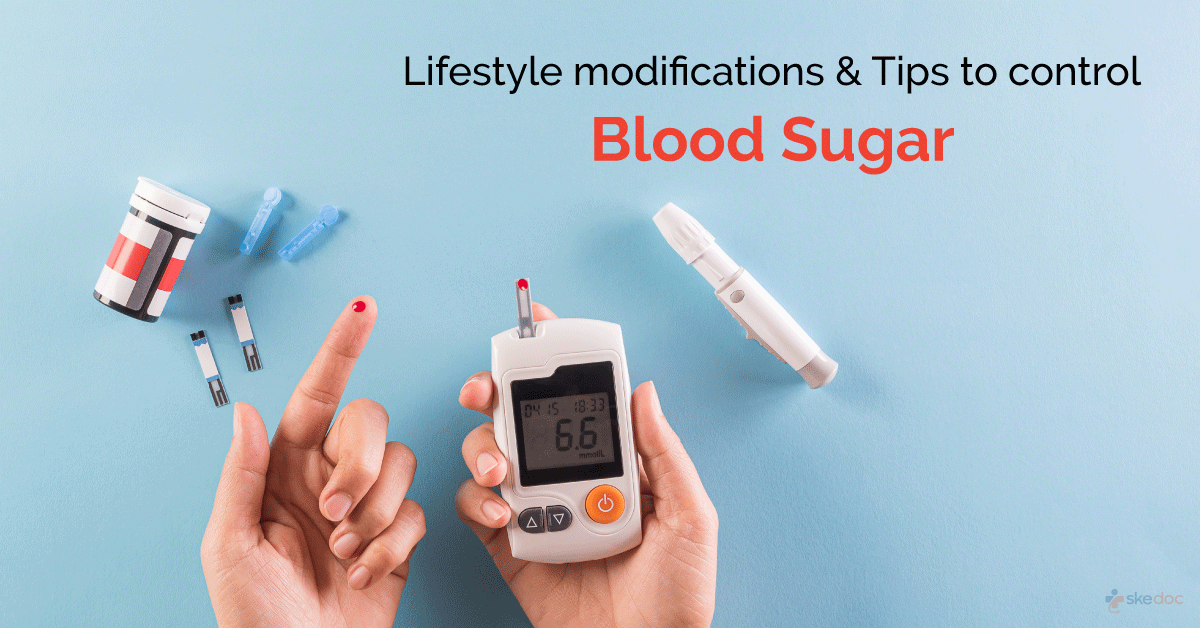Allergy
Blood Diseases
Bone & Joints
Brain
Cancer
Child Care
Cosmetic Surgery
Diabetes
Endocrinology
ENT
Eye
Gen Medicine
General Surgery
Heart
Kidney
Lifestyle
Liver & Digestive
Lung
Men’s Health
Mental health
Physiotherapy
Rheumatology
Skin and hair
Sleep Disorders
Spine
Transplant
Women Health
Thyroid
Vascular Surgery
Lifestyle Modifications and Tips to Control Blood Sugar

Diabetes mellitus is a chronic condition that results in an increase in blood sugar levels leading to many metabolic and physical complications that pose a severe health risk and significantly reduce the overall quality of life if measures are not taken to keep the levels of the rising blood sugars under proper control.
It is primarily classified as Type 1 Diabetes which is caused by the absence or reduced production of insulin, the hormone that is responsible for maintaining blood sugar levels, and Type 2 Diabetes develops when there is a reduced sensitivity of the cells and tissues to the action of insulin resulting in increased levels of blood sugar. In both types, elevated blood sugar levels play havoc with the body's normal functioning, leading to complications that affect the heart, blood vessels, kidneys, eyes, and nerves. Diabetes develops slowly, and especially in type 2 diabetes, there may be no warning signs in the early stages.
Early signs & symptoms
As the disease progressively worsens, signs and symptoms such as increased appetite, increased thirst, increased frequency of urination, tiredness, fatigue, poor wound healing, loss of weight, etc., may begin to present, which would then prompt investigations such as fasting and postprandial blood sugar level checks, and HbA1C levels to diagnose the presence of the condition.
Management of diabetes is primarily done by medications that help increase insulin production, reduce the amount of glucose released by the liver into circulation, or block the breakdown of carbohydrates, lowering blood sugar levels. While medications effectively control blood sugar levels and keep them in check, they come with side effects such as gastrointestinal problems, lactic acidosis, dizziness, hunger, heart rate problems, confusion, blurred vision, etc.
Points to consider while creating a diabetes diet plan
Diabetes is a long-term disease, and according to endocrinologists, a healthy lifestyle for diabetics is the best medicine that can be prescribed.
Our diet and eating habits are an essential part of our lifestyle, and nothing has a greater impact on diabetes and control of blood sugar than our diet does. It is, therefore, essential to understand what is going into our bodies and how they utilize it. Important points to keep in mind while preparing a diet plan for diabetes are
- Be mindful of carbohydrate intake
- Increase intake of fiber
- Manage portions, calorie intake, and the number of meals in a day
- Choose foods with a low glycemic index
- Eat slowly
- Ensure there’s a proper balance of protein and healthy fat in your meals
- Stay hydrated and drink plenty of water
Role of Exercise/ Healthy Lifestyle Changes
Another important aspect of a healthy lifestyle is exercise and physical activity. Modernization, automation, accessibility, and work environments have drastically changed over the years, leading to a lifestyle that is increasingly less reliant on physical activity and mobility. Physical activity and exercise play a vital role in maintaining blood sugar levels. A sedentary lifestyle becomes diabetes’ best friend and the individual’s worst enemy. It is important to include exercise as an integral part of your daily routine. Exercise and physical activity, such as running, brisk walking, cycling, dancing, aerobics, etc., help control body weight and ensure that blood sugar levels are kept in check and maintained at the appropriate levels. Maintaining ideal body weight is also an important aspect of diabetes control which is a direct result of lifestyle modifications such as diet and physical activity. Being overweight or obese increases the risk not only of poor diabetes control but also of complications related to the heart and kidneys.
A fast-paced life, work pressures, tight deadlines, financial troubles, relationship troubles, and an endless list of other daily things contribute to stress. Stress plays a major role in how our body performs and carries out its basic activities, including maintaining blood sugar levels. Extreme physical and mental stress can result in the spiking of blood sugar levels and poor diabetes control. Identifying the presence of stress in our lives and taking all required measures to reduce or eliminate it is essential if blood sugar levels are to be maintained at their right levels. Getting enough sleep helps not only with the management of stress but also with keeping blood sugars under control.
Several other things that creep into our daily lives and impact our overall health include smoking, alcohol consumption, use of recreational drugs, etc. Smoking and alcohol are directly associated with both the development of diabetes and the worsening of existing diabetes. The cessation of smoking and cessation or moderation of the consumption of alcohol are essential components of a healthy lifestyle that need to be taken if diabetes and blood sugar levels have to be kept in check. It is also important to note that these habits not only impact diabetes but can also lead to various other diseases, such as heart, liver, and lung disease, with potentially fatal complications.
Diabetes can be controlled effectively, and its complications can be prevented if these simple yet essential healthy lifestyle modifications are adopted. It is important to book an appointment with an endocrinologist near you or consult an online to know about the importance of lifestyle modifications and appropriate medication if you have diabetes, and then implement their advice and take the prescribed medicines without fail.
Was this article helpful?
YesNo
Comments





